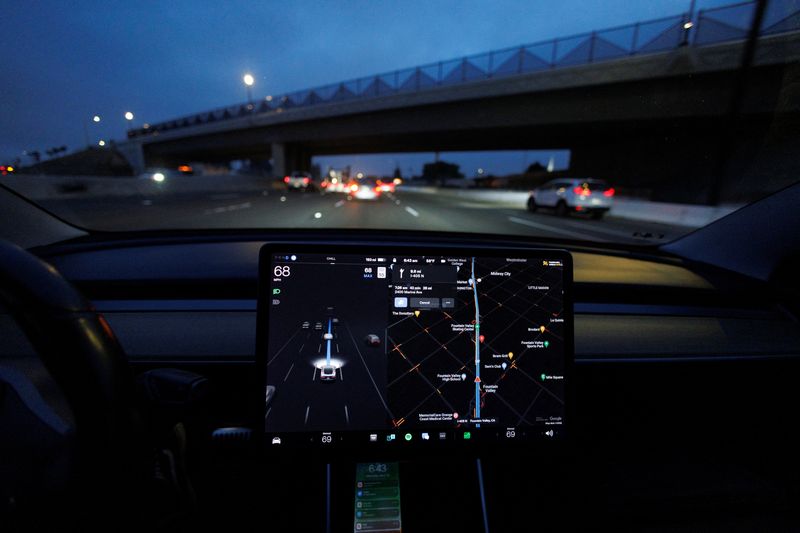By Hyunjoo Jin and Joseph White
(Reuters) -The U.S. auto safety regulator investigating Tesla (NASDAQ:TSLA)'s Autopilot driver assistance system is demanding an explanation for a software change that allows drivers to keep their hands off the wheel for longer, risking collisions, documents released on Tuesday showed.
The National Highway Traffic Safety Administration (NHTSA) ordered Tesla to answer questions about the Autopilot change and produce documents in a so-called special order dated July 26. The NHTSA order did not compel Tesla to recall vehicles.
"The resulting relaxation of controls...could lead to greater driver inattention and failure of the driver to properly supervise Autopilot," NHTSA said in its letter to Tesla.
The NHTSA order underscores the challenges regulators face keeping up with safety-critical vehicle technology that can be changed overnight with a software upgrade delivered over the air.
NHTSA asked when the software update was introduced, the number of vehicles affected, Tesla's reason for installing, and collisions or near-misses involving vehicles with the software.
"NHTSA is concerned that this feature was introduced to consumer vehicles and, now that the existence of this feature is known to the public, more drivers may attempt to activate it," the agency wrote.
In April, Chief Executive Elon Musk tweeted that Tesla is gradually reducing the steering wheel nag - alerts aimed at making sure drivers using Tesla's "Full Self-Driving" (FSD) system keep their hands on the wheel. He also this week said "Yeah" in response to an X message that "No steering wheel nag will be a *game changer* for FSD user satisfaction."
Musk will soon face a major test of his assertions about the technology's safety when Tesla defends itself later this year in a trial over allegations that failure of its Autopilot driver assistant feature led to death.
Tesla shares were up 7% in late trading Tuesday, outpacing the broader market.
The agency's acting head Ann Carlson told Reuters last week that a resolution of the Autopilot investigation will come soon.
Speaking broadly about the problem of driver attention, Carlson said it is "really important that driver monitoring systems take into account that humans over-trust technology."
Major automakers are racing each other to deploy technology that allows motorists to take their hands off the wheel under certain conditions.
General Motors (NYSE:GM), Mercedes-Benz (OTC:MBGAF) and other automakers are challenging Tesla's Autopilot technology. But those automakers use more robust monitoring systems than Tesla's to assure drivers keep their eyes on the road and are ready to re-take control.
The agency is investigating the performance of Autopilot after identifying more than a dozen crashes in which Tesla vehicles hit stationary emergency vehicles. It is also investigating whether Tesla vehicles adequately ensure drivers are paying attention when using the driver assistance system.
In June 2022, NHTSA upgraded an earlier probe of 830,000 Tesla vehicles into an engineering analysis - a required step before it could potentially demand a recall.

Autopilot is intended to enable cars to steer, accelerate and brake automatically within their lane, while "Enhanced Autopilot" and “Full Self-Driving” allow vehicles to do more sophisticated driving tasks. Tesla says those technologies “require active driver supervision and do not make the vehicle autonomous.”
The special order requests documents and explanations by Aug. 25 to help with NHTSA's inquiry. Late responses can incur a penalty of $26,315 per day.